The Promise (Wu Ji)
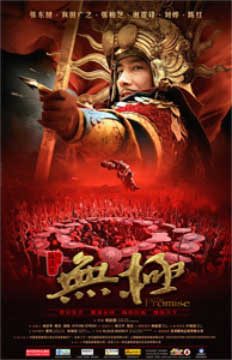
Film review by Lee Alon
As the badly-subtitled intro to this hype-tastic
number comes on screen, something suitably "mystical" gets muttered about
how gods allow humans to choose their fate while obscuring the outcome of
decisions taken. How true, how apt. For example, a human forks over hard
earned moola for a movie ticket, hoping for the best. Then, these anonymous
gods scheme their dastardly plots, dashing all wishes for a pleasurable cinematic
experience, delivering instead a two-hour tragedy of mistakes any mortal
would sooner forget. Thanks a lot, Chen Kaige. As if being tormented by his
laboriously over-sentimental Together a few years ago wasn’t enough. Granted,
this fifth generation wunderkind has had a few successes, most notably the
epic Emperor and the Assassin (this writer never took to Temptress Moon or
Farewell My Concubine), but here we see him shamed by a product so lacking,
so flawed, it'll take Mr. Chen much to make proper amends.
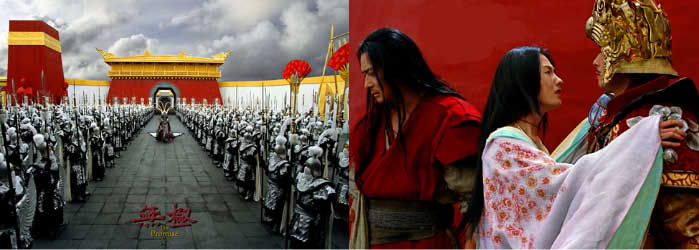
The Promise features a compelling enough story. It could even have been outright
gripping in the hands of directors like Ching Siu Tung or Raymond Lee, even
Corey Yuen. Those guys would see this tale for its, tsk tsk, promise: the
ability to be a whacked-out, gung ho wuxia marathon teeming with insane antics
and exaggerated martial arts capabilities. Instead, someone trusted a supervisor
better suited to History Channel specials on the Mongol invasions, resulting
in a slow-paced, awkward exercise handicapped by lame fight scenes and effects
that do little more than embarrass viewers into cringing in their seats.
This echoes other movies, namely Hero. That one also had a director ill-prepared
for an action story, hence the pretentious, pompously aloof end-product fared
best in putting audiences to sleep. Zhang Yimou did learn a couple of lessons
by the time House of Flying Daggers came about, so perhaps Chen Kaige will
also emerge stronger later on.
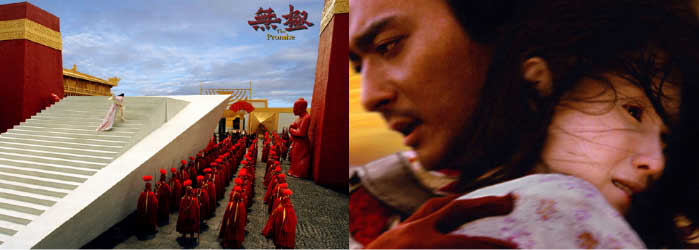
At least for this one he didn't give himself a huge part as per previous
films. Rest assured, however, nepotism didn't retire entirely to the nosebleed
section. His wife Chen Hong puts in quite the hefty cameo as a coldly aristocratic,
and more than a tad annoying, deity, through which the plot gets rolling.
We first see a conspicuously blood-less battlefield after hostilities have
ended, with scores of troops lying around looking like bored extras out of
film school. A little girl known only as Qingcheng scrounges around for food
when goddess Chen intervenes, making a pact with the young protagonist. It
involves Qingcheng promising to amuse the superior being by enjoying everything
life has to offer in exchange for never holding on to love or happiness.

A few half-baked CGI renders later we move 20 years into the future, and
to another battlefield, now commanded by General Guangming (Hiroyuki Sanada).
Arrogant and self-assured, the general achieves victory thanks to help from
abnormally strong and swift slave Kunlun (Jang Dong-kun). The latter even
saves his new master's life soon enough, donning the military man's notorious
Crimson Armor. A weak story device sees them embroiled in the death of this
unnamed kingdom's monarch, thus more or less becoming outlaws, even though
the movie never bothers to really make this clear. The pair then move on
to face despotic warlord Wuhuan, done by a passable Nicholas Tse, who tries
hard to inject some of that wuxia madness into his villain, but, alas, falls
short of attaining this lofty goal. At least he possesses a massive army
of cool, Stormtrooper-esque maniacs that are a pleasure to behold, in addition
to commanding his own henchman, a counter to Kunlun apparently. Enshrined
in a cloak bestowing the gift of flight and faster-than-time travel on its
wearer, Wuhuan's errand-killer Snow Wolf (subtitle name, in Chinese he's
Ghost Wolf) adds a sad, tragic theme to The Promise, largely thanks to its
gifted thespian vehicle, Liu Ye.
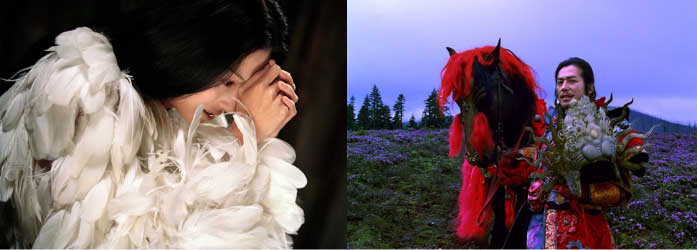
That's really not enough, though, and quickly everything goes wrong as the
plot reveals itself to have absolutely no driving force, and the would-be
clash of titans between the forces of good and evil amounts to less than
a storm in a teacup. Maybe a gurgle in a can of soda, unopened at that so
nobody even notices. Only Hiroyuki Sanada's input truly deserves positive
mention. His characterization of the general behaves naturally as a vain
bully with good intentions might, and one learns to buy into his spiel with
ease, always the mark of good acting. The cosmopolitan cast composition remains
an unused asset given The Promise's numerous problems.
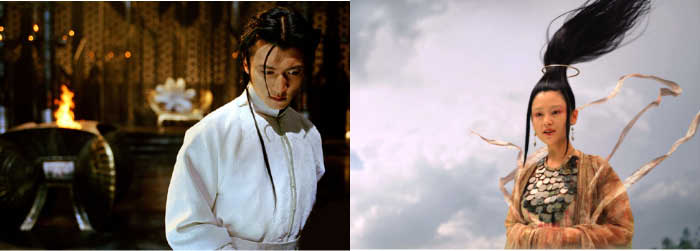
Sadly, the worst offender's Cecilia Cheung, a favorite usually, and one actress
who has proven herself time and again in comedy and gritty realism. She plays
a grown Qingcheng as the movie's love interest, but just like her director,
falls victim to miscasting, either that or they just couldn't get Zhang Ziyi.
At any rate, she spends most of her time trying to mimic Crouching Tiger's
pouting heroine, resulting in a disastrous mess that's not helped by the
atrocious makeup unleashed on the young lass. We can only guess as to why
this came to pass, but at the end of the show Cecilia's a major disappointment.
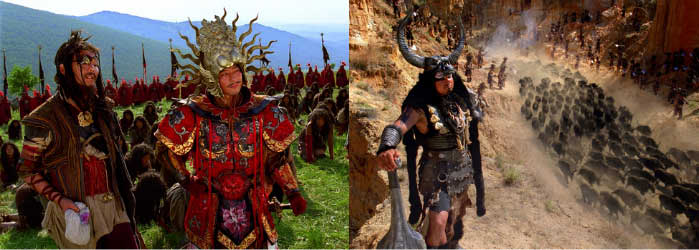
Compound matters with lousy action bits, grating, corny visual effects and
desolate interregnums amid plot, and you get The Promise inducing snoozes
all around. One thing did keep folks awake was the bombastic soundtrack,
so loud and hilariously overdone it drowned dialog in several occasions,
which all things considered wasn't too bad a trade-off. Going back to choices
and fate, of course one can’t always anticipate what lurks behind every bend.
But allow us to play oracle briefly, and see into your misty futures: you
will lose two hours of your life by watching this. Promise to do something
worthwhile instead, like cleaning out your bathroom soap dish or finally
getting around to washing that shower curtain. It'll pay back dividends in
spades.
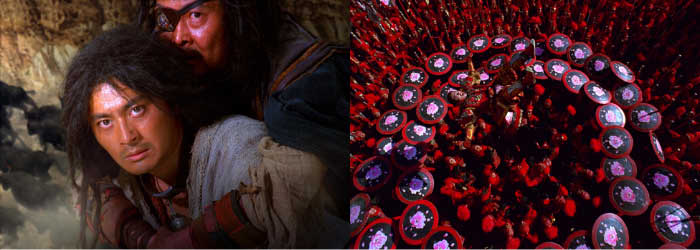
Rating: 4/10
Contact Lee Alon here








